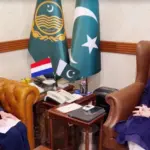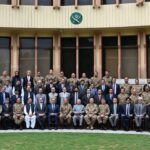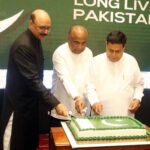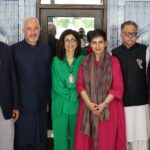ISLAMABAD, Nov 2 (APP): Foreign policy and security experts have expressed the hope that the future of Pak-US relations was bright however there was a need to expend time and energy to bolster cooperation in the fields of environment, economy, technology, and agriculture.
Addressing a two-day conference held Tuesday in Washington, the experts argued that ties between the two countries had been topsy-turvy and the post-Afghan war period allowed both Islamabad and Washington to start afresh and de-hyphenate with a view to building cooperative mechanisms on issues of common concern.
The conference was organized by the Center for Security, Strategy and Policy Research(CSSPR), University of Lahore, The School of Advanced International Studies, Johns Hopkins University, South Asia Center, Atlantic Council, and Engro Corporation.

The conference brought together Pakistani and American experts and officials to discuss a range of themes critical to the future of Pak-US relations.
In his welcome address, CEO and President of Atlantic Council, Fred Kempe said Pakistan was an enormous, resourceful, and important country, and therefore ties must be recalibrated and made even-handed.
The conference featured a keynote address by the Ambassador of Pakistan to US Ambassador Masood Khan who said that start-ups had increased exponentially in Pakistan which could prove to be propitious for US investors.
He added that the presence of the US business giants in Pakistan, the burgeoning Pakistani-American community in the US, and the increasing trade volume between the two countries add strength, depth, and breadth to their relations.
He talked about the devastation caused by the recent floods in Pakistan, adding that the country was looking to benefit from US technology and expertise in becoming more resilient to climate change.

The ambassador stressed that both countries must work towards promoting conflict resolution, crisis management, and strategic stability in the region.
In his remarks, Special Representative for Commercial and Business Affairs at US Department of State, Dilawar Syed said dealing with the impacts of floods was most compelling challenge for Pakistan.
The two sessions of the conference focused on discussing different perspectives, identifying areas of common concern, and shedding light on the opportunities provided for by technology to the Pakistani economy.
The sessions were moderated by Non-Resident Senior Fellow, Atlantic Council, Shamila Chaudhary, and Director, Pakistan Initiative, Atlantic Council, Uzair Younus.
The panelists included Director CSSPR Dr. Rabia Akhtar, Senior Advisor, South Asia, United States Institute of Peace, Daniel Markey, former Chief of Naval Staff, Pakistan Navy, Adm. Tahir Afzal, Director, China Program, Stimson Center, Yun Sun, former Chairman, Special Technology Zones Authority, Amer Hashmi, Co-founder and Managing Partner, Quona, Monica Brand Engel, CEO, EcoEnergy, Shazia Khan, and CEO, TRG International, Mohammed Khaishgi.
Addressing a session, Senior Advisor, South Asia, United States Institute of Peace, Daniel Markey said Pakistan’s economic success was not only critical for that country but also for the US, not least because failure in the said domain has security implications.
Director, CSSPR, Dr.Rabia Akhtar Dr. Rabia Akhtar said Pakistan’s foreign policy direction and priorities must not change, owing to changes at the helm in the capital.
Director China Program, Stimson Center, Yun Sun said China was optimistic about the future of Sino-Pak relations. She further remarked China was open to not only rejigging its ties with Pakistan but also to seeing that country iron out difference with the US.
Addressing the conference, former National Security Advisor of Pakistan, Dr. Moeed Yusuf, said Pakistan wanted to enhance economic security, shift towards a two-pronged geoeconomic paradigm, and avoid camp politics.
He said Pakistan aspires to become a melting pot for economic interests of regional and global powers.
In the session entitled ‘The US – Pakistan Relationship in a Multipolar World: Opportunities and Headwinds’ , panelists in Dr. Aneel Salman, Amb, Jorge Guajardo, and Tamanna Salikuddin shared their thoughts on Pakistan’s economic security profile, the balancing act for that country between China and the West, and Washington’s policy towards Islamabad, respectively.
In the next session on ‘Modernizing Pakistan’s Agriculture Sector through Greater Private-sector Investments’ experts in Dr. Abid Suleri, Ehsan Malik, Maaz Gardezi, and Hans Jansen spoke to the need for reforming the said sector in Pakistan through technology-led interventions.






